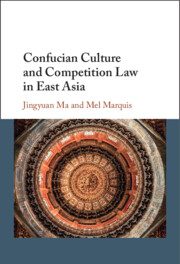Book contents
- Confucian Culture and Competition Law in East Asia
- Confucian Culture and Competition Law in East Asia
- Copyright page
- Contents
- Preface
- Abbreviations
- 1 Introduction
- 2 Confucian Culture and Its Influence in East Asia
- 3 Confucian Business Culture and Its Implications for Competition Law
- 4 Confucian Corporate Culture and Competition Compliance
- 5 Confucian Political-Bureaucratic Culture and Its Links with the Administrative Enforcement of Competition Law
- 6 Confucian ‘Litigation Culture’ and the Under-development of Private Antitrust Enforcement
- 7 Confucian Legal Culture and the Regional Response to the Criminalization of Cartel Conduct
- 8 Conclusion
- Selected Bibliography
- Index
4 - Confucian Corporate Culture and Competition Compliance
Published online by Cambridge University Press: 01 September 2022
- Confucian Culture and Competition Law in East Asia
- Confucian Culture and Competition Law in East Asia
- Copyright page
- Contents
- Preface
- Abbreviations
- 1 Introduction
- 2 Confucian Culture and Its Influence in East Asia
- 3 Confucian Business Culture and Its Implications for Competition Law
- 4 Confucian Corporate Culture and Competition Compliance
- 5 Confucian Political-Bureaucratic Culture and Its Links with the Administrative Enforcement of Competition Law
- 6 Confucian ‘Litigation Culture’ and the Under-development of Private Antitrust Enforcement
- 7 Confucian Legal Culture and the Regional Response to the Criminalization of Cartel Conduct
- 8 Conclusion
- Selected Bibliography
- Index
Summary
Chapter 4 analyses corporate culture in East Asia with a view to understanding how Confucian cultural norms can inform efforts to promote compliance with competition law. It suggests that practices to secure compliance among commercial operators can usefully be tailored to takes account of cultural characteristics. This implies a need to consider the legacy of Confucian ethics, which has had a profound influence on the organizational psychology and behaviour of commercial entities in the region. The importance of that legacy suggests that compliance will not be achieved within firms solely on the basis of the external legal environment, an environment in which deterrence-oriented factors such as sanctions and the threat of detection play a central role. Beyond traditional tools, more attention should be given to the internal moral and social environment, and to shaping the logic of appropriateness within a given firm. A compliance culture can thus be constructed on the basis of elements such as moral commitment, Eastern-style education, the cultivation of virtue, and the constructive convergence of the interests of the enterprise and those of its employees.
- Type
- Chapter
- Information
- Confucian Culture and Competition Law in East Asia , pp. 88 - 144Publisher: Cambridge University PressPrint publication year: 2022

